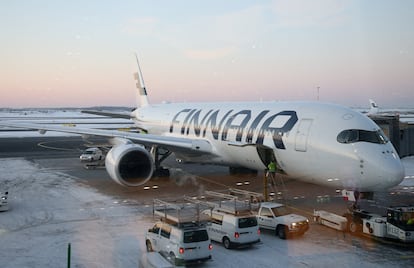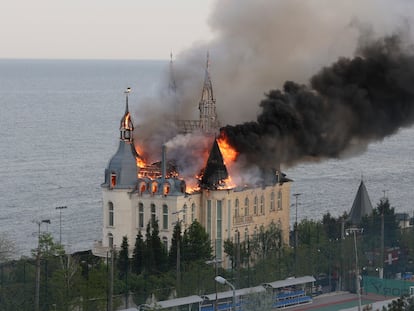Russia leaves thousands of planes without GPS in northern Europe
Several NATO members accuse Moscow of deliberately jamming positioning signals


GPS is no longer reliable around the Baltic Sea and northern Norway. Interference in the Global Positioning System (GPS), which has affected all NATO members bordering Russia for two years, has worsened in recent months. Alternative systems to GPS have had to be activated on tens of thousands of flights and the main Finnish airline has suspended one of its routes due to the problem, which is also disrupting maritime navigation. Several of the affected countries accuse Moscow of intentionally jamming signals with its electronic warfare systems.
Since the Russian invasion of Ukraine in February 2022, GPS interference has been recurring in Estonia, Latvia and Lithuania. These types of disruptions are common in and around conflict zones. Even so, in the last half year, the airspace of the three Baltic countries — in addition to that of Finland, Sweden and Poland — has been much more affected than at the beginning of the war. What’s more, thousands of ships have been navigating the Baltic without GPS since December, when the Russian army’s electronic warfare began in the Kaliningrad enclave. And in remote northeastern Norway, near Russia’s Northern Fleet base — which has eight of the 11 Russian submarines capable of launching long-range nuclear missiles — outages are almost daily.
Last week, two Finnair planes had to turn around and return to Helsinki after failing to reach Estonia’s Tartu airport. The airline suspended the route between the Finnish capital and the second most populous city in Estonia. Unlike the vast majority of European airports, planes can only land at Tartu with a GPS signal. Lauri Soini, chair of the Finnish Pilots Association, told Reuters that for the past six months, GPS jamming has been affecting an “area extending from Poland across the Baltic states to the Swedish and Finnish coasts, also affecting lower altitudes and maritime traffic.”
Estonian Foreign Minister Margus Tsakhna reacted to the decision to pause flights to Tartu with a post on the social network X, in which he accused Russia of jamming GPS navigation devices. Tsakhna said he had spoken with his Latvian, Lithuanian, Finnish and Swedish counterparts and insisted that the matter to be discussed among all NATO allies and EU members. In an interview with the Financial Times, the minister said the interferences were part of “Russia’s hostile activities” and “a hybrid attack.”
Losing the GPS signal mid-flight does not, in principle, pose a serious risk. Commercial airliners have several older alternative systems. However, Dana Goward, director of the Resilient Navigation and Timing Foundation and a member of an advisory council to U.S. President Joe Biden, tells EL PAÍS by phone that interference “inevitably reduces the safety and efficiency of aviation.” Goward points out that in recent months “the risk of an accident occurring has increased” and that Russia has several types of electronic warfare systems that can disrupt GPS signals at different altitudes and distances.
In addition to interference, cases of spoofing — when a device broadcasts a false GPS system to trick the receiver into believing fake location or time variables — have also risen significantly.
Todd Walter, director of the GPS Laboratory at Stanford University, explains that trying to locate exactly where the interference is coming from is a complex process. “Our estimates will never be completely precise, but everything indicates that the focus of the disruptions in the Baltic is located in Kaliningrad,” the researcher tells EL PAÍS in a video call.
“Human lives may be lost”
In northeastern Norway, thousands of miles from the war front, authorities are trying to adapt to life without GPS. GPS interference has been recorded on more than 95% of the days since January 2023. Occasionally, at sea level, citizens have lost the signal on their cell phone or have received erroneous information about their location. The Norwegian Communications Authority says that at more than 1,500 meters altitude the interference is intermittent, and that above 3,000 meters it is practically continuous. In addition to thousands of internal flights, ambulance helicopters — which provide an essential service in one of the least densely populated areas in Europe — are also affected.
Although the war in Ukraine has ruptured relations between Norway and Russia, regular meetings are still held to discuss border issues. In one of these meetings, Ellen Katrine Haetta, police chief in the Finnmark region, detailed the risks that interference poses to search and rescue operations. “It’s very serious. Human lives may be lost,” Haetta told local media. “The FSB [Russia’s Federal Security Service] told me that they will investigate the matter,” she said.
In the Baltic, GPS maritime navigation is increasingly rare and, given the risks involved, insurers have raised the cost of premiums. Lieutenant Colonel Joakim Paasikivi, a member of the Swedish Defense University, told Swedish broadcaster SVT that the interference to maritime navigation was “part of Russian influence activities, or so-called hybrid war” against NATO countries.
In late April, the German Defense Ministry said, “The persistent disruptions to the global navigation satellite system are very likely of Russian origin,” and specifically pointed to Kaliningrad, the Russian territory wedged between Poland, Lithuania and the Baltic Sea. In March, a plane carrying British Defense Minister Grant Shapps had to activate alternative global positioning systems while passing through an area near the Russian territory. On December 25 and 26, Poland recorded interference lasting more than 30 hours, which was spread across a large part of the country.
Electronic warfare systems
Russia has powerful electronic warfare systems. Several reports from the Center for Advanced Defense Studies detail the extensive spoofing campaigns that the Russian army has carried out from different bases it controls in Syria. The Washington-based analysis center also states that, when Russian President Vladimir Putin has traveled to occupied areas of Ukraine, such as the Crimean peninsula or the city of Mariupol, he has been flanked by mobile electronic warfare systems. During NATO’s military exercises in northern Norway in 2018, which also involved soldiers from Sweden and Finland — although they were not yet NATO members — Oslo and Helsinki accused Moscow of disrupting the GPS signal in part of their territory.
Russian electronic warfare systems are used daily in Ukraine to inhibit enemy drone communications, and even to divert the trajectory of U.S. Himars missiles. The Russian military also repeatedly jams the GPS signal around Moscow and St. Petersburg, or in regions far from the border where refineries have been attacked by Ukrainian drones. Disturbances are also common around the Black Sea, where Ukrainian water drones have repeatedly hit Russian Navy ships.
At the end of January, the European Aviation Safety Agency (EASA) and the International Air Transport Association (IATA) held a meeting in the German city of Cologne to address the growing cases of interference and spoofing. In a joint statement, EASA and IATA noted that the problems with GPS “pose significant challenges to aviation safety” and, in the absence of viable technical solutions in the short term, called for improved pilot training to address the issue.
Martin Herem, commander of the Estonian Armed Forces, said in a recent interview with a local media that Russia is “testing” its powerful electronic warfare systems in anticipation of a future conflict with NATO. Goward and Walter believe this is a reasonable argument, and both have no doubt that at least part of the interference in the Baltics is intentional.
Sign up for our weekly newsletter to get more English-language news coverage from EL PAÍS USA Edition









































